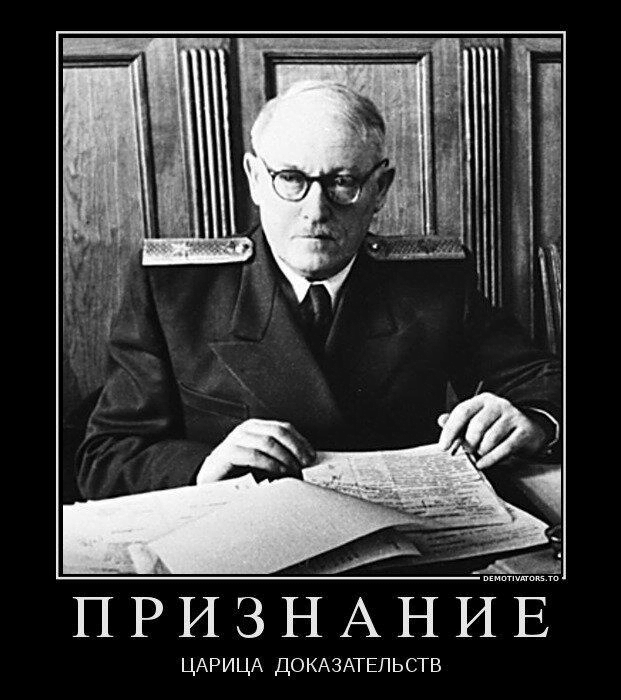The phrase “Confession is the queen of evidence” is often attributed to prosecutor Vyshinsky. Let's check if it belongs to him.
The phrase “Confession is the queen of evidence” has been attributed for more than 30 years to the Stalinist prosecutor, who actively participated in political repressions and the so-called “Moscow trials” of the 30s of the 20th century, Andrei Yanuaryevich Vyshinsky. Most often, his monograph is indicated as the primary source. "Theory of judicial evidence in Soviet law" (1941).
Before 1988, this phrase, however, almost never appears either in books or on the pages of the Soviet press. Anyway National Corpus of the Russian Language does not know a single mention of it. Using the Google Books service, we managed to find it in two places: on the pages of the detective story “Playing with Shadows,” published in 1966 in the magazine "Ogonyok" (No. 39), as well as in the detective story of the Weiner brothers “Avoid downed cats and dogs on the roads”, published in 1986 on the pages of the magazine “Friendship of Peoples” (No. 7). But there is no mention of Vyshinsky in both described cases.
Why did the phrase become a catch phrase among us after 1988 and since then has it been inextricably linked with Vyshinsky? The fact is that this year in "Literary newspaper", one of the most important printed organs of the still unified country, published an article by lawyer and writer Arkady Vaksberg, “The Queen of Evidence,” dedicated to Vyshinsky. It is interesting that in the article itself the author does not attribute such words to the prosecutor, but only says the following: “Among the many scientific works of Academician Vyshinsky, the monograph “The Theory of Forensic Evidence in Soviet Law” was especially highly valued in those days. It was there that one of the main postulates of the ancients was given, which was actively and exaggeratedly exploited by the repressive machine: “The confession of the accused is the queen of evidence.”
This is a true statement. It is non-judgmental. Talks about a fact that is easy to verify. Indeed, for centuries lawyers have used the Latin saying "confessio est regina probationum" And Vyshinsky cited it more than once in his writings. However, he criticized it as an outdated principle of bourgeois law, specifically mentioning that such confessions were often extracted under torture, and this is unacceptable.
But Vaksberg, as well as many other historians and lawyers wrote that in real trials Vyshinsky, like the entire Stalinist judicial system, was guided by precisely this principle. Confessions given under the most cruel torture did not bother anyone, forming the basis for indictments.
At the same time, such subtleties did not linger in the minds of a wide readership, and the phrase began to be massively attributed to Vyshinsky himself. To be fair, we note that Vaksberg did not try to dispel the myth that was created, wittingly or unwittingly. In 1992, the writer published the book “The Queen of Evidence. Vyshinsky and his victims”, which cemented it.
Even the refutation of the erroneous attribution given back in 1997 in the first edition "Dictionary of modern quotations" edited by Dushenko, the situation did not change. Vyshinsky's pseudo-quote became a meme that is still repeated today politicians And serious publications.
In numerous apologetics in relation to Stalin and his entourage books Over the last twenty years, authors have loved to analyze this “liberal myth” in detail. At the same time, they conclude that since Vyshinsky criticized the principle under discussion in theoretical works and public speeches, it means that he did not adhere to it in real judicial practice. And this does not follow from anywhere. That is, in place of one myth, another is immediately created, only with the opposite sign.
The correct approach is to separate facts from opinions and interpretations. The fact is that attributing the phrase “Confession is the queen of evidence” to Vyshinsky is a mistake, a myth. And what principles the prosecutor was guided by and on what grounds he built his indictment speeches at real trials is easy to find out by reading these numerous published speeches and works of professional historians who studied the trials themselves.
Incorrect quote attribution
Read on topic:
- https://author.today/post/50120 Complete and high-quality analysis from Vadim Nesterov.
- http://a-pesni.org/zona/totalitar/caricadoc.htm “Literary Newspaper”, No. 4 (5174), January 27, 1988 (reprint of the article).
- https://biography.wikireading.ru/144818 A little about Vyshinsky - a chapter from A. G. Zvyagintsev’s book “The Fatal Themis. Dramatic fates of famous Russian lawyers."
If you find a spelling or grammatical error, please let us know by highlighting the error text and clicking Ctrl+Enter.






